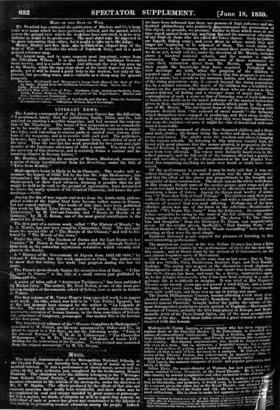• the Crystal I'alace, on Saturday last, was a thing
of moral as well as niustimil interest. It was a performunce of choral music, sacred and se- cular, in the new orchestra just completed for the forthcoming Handel Festival. The choristers were the children belonging to the "Metropo- litan Schools Choral Society," an association established to promote musical education in the schools of the metropolis, under the direction of Mr. G. W. Martin. The effects produced by the efforts of that able and eminent musician have really been wonderful, and show what may be accomplished by zeal and energy unaided by great names or patronage: for it is a matter, we think, of surprise as well as regret that scarcely- an individual of rank or power has given any countenance to the labours of this society in promoting musical education among the people. Indeed, we have been informed that there are persons of high influence and un- doubted philanthropy who positively discountenance the prosecution of this object, on grounds, we presume similar to those which were at one time urged against bestowing anything beyond the narrowest education of any kind on those who are called the lower classes. Such prejudices are happily fading away ; and even those in whose minds they still linger are beginnmg to be ashamed of them. The vocal union (or Gesangrerein, as the Germans, who understand these matters better than we do as yet, would call it,) under the direction of Mr. Martin, includes above a hundred national schools, and the number is rapidly
increasing. The masters and mistresses of those seminaries re- ceive their instruction direct from Mr. Martin, and impart to their pupils the knowledge they have acquired. Periodical dis• trict meetings are held, when the progress of the children is reported upon ; and it is pleasing to know that this progress is not con- fined to music, but extends to the manners, habits, and whole character of the rising generation—nay, it extends beyond the rising generation, for, by a natural reaction, the music of the children has a healthful in- fluence on the parents, who imbibe from those who are dearest to them greater delicacy of feeling and a stronger sense of moral duty. The contemplation of such a scene as that of Saturday was of itself sufficient lo banish any doubt as to the moral influence of the musical instruction given in those metropolitan national schools which profit by the assist- ance of Mr. Martin. The intelligent faces of the children, beaming with pleasure derived from "the concord of sweet sounds"—the harmony which themselves were engaged in producing, and their clean, healthy, well cared-for aspect, showed not only that they were happy themselves, but were the inmates—of poor, it might be—but of decent and well-con- ducted households.
The choir was composed of about four thousand children and a thou- sand male adults ; the former being the trebles and altos, the latter the tenors and basses. The adults were the teachers and others belonging to the various schools. In listening to this immense tuneful host, we found with great pleasure that the means adopted, in preparation for the Handel Festival, to improve the acoustical properties of the orchestra, have been very effectual. The voices were distinctly heard even in the softest passages; and the full swell of the harmony often had a grandeur not only exceeding any of the effects produced at the last Handel Fes- tival, but surpassing anything we have ever heard or could have con- ceived.
Of the performance in general it may be truly said that it was ex- cellent throughout ; that the sacred portion was the most impressive; and that the effect of the pieces was proportionate to the breadth and simplicity of their construction. The music was on the whole well chosen in this respect; though some of the secular pieces—part songs and glees —were too light both in form and style to be effectively rendered by so ponderous a mass of voices. Among the things most worthy of notice was "0 Thou that Tellest Good Tidings." The children sang their parts with all the accuracy of a trained chorus, and with a simplicity and ear- nestness of manner that was most affecting. l'erhaps one of the least effective pieces was oho of the finest in the selection—Mendelssohn's chorale " We Praise Thy Name" from the Zobgnang. Its comparative failure seemed to be owing to the want of the full orchestra, the organ being unable to give the effect required. The chorus " To The Cheru- bim and Seraphim" from the Dettingen To Deum, was magnificently given. Of the secular pieces, Spofforth's "Hail Smiling Morn" and Stafford Smith's " Hark, the Hollow Woods resounding" were the most pleasing, as they were the most simple.


































 Previous page
Previous page